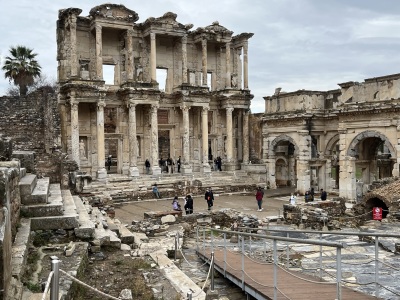What's it like to tour 'Bible country' in person

There is an arresting phrase that appears in St. Paul’s letter to the Romans. He speaks of those who “walk in the footsteps of faith.” He is reminding this early Christian Church that the promises given Abraham are realized through faith by which we are justified before a holy God. But the phrase also reminds us that we can walk in the footsteps of those who have gone before us. Today we can do that literally.
This summer I led another group tour to “Bible country” where we followed the missionary journeys of Paul. I have now led seven such study trips. I refer to this as “vacation with a higher purpose,” These trips are life-changing. On this particular trip we traveled to Greece, Turkey, and Italy. We visited sites where Paul founded churches, such as Philippi and Corinth. We cruised to Ephesus and Patmos, with stops at the beautiful islands of Mykonos, Crete and Santorini. The trip concluded in Rome, where Paul was executed. I’ve also led groups to the sites of the seven churches of Revelation, to Reformation sites in Europe, historic Christian Britain, and most of all, to Israel.
What is the value of a vacation with a higher purpose? The short answer is that it fortifies your faith. How so? First, it demonstrates that the places we read about in the Bible are real. They are not legend or fairy tale. They are concrete places that existed then and exist now, and you can visit them today. Imagine that you have been studying a Shakespeare play. You know it, understand it fairly well, and read it carefully. But then, one day, you go to Shakespeare’s hometown of Stratford, England, or the Globe Theater in London. This experience will make the play “come alive.” Now imagine doing that in Bible country. The impact is spiritually powerful. It enlarges your view of God.
A trip like this is not like a beach vacation. We are literally “walking in the footsteps of faith” where the Israelites walked, or Jesus walked, or where the apostles and early Christians actually walked. When we visit a sight, we open the Bible, read and explain the passage, and point to what happened right in that very spot.
A trip like this helps make the Bible come alive. Before the trip begins, I tell our group to read various scripture passages because we will be standing, sitting or walking near or at the exact spot where it happened. So recently, we read and taught on location about Lydia of Philippi at the very river where she heard Paul preach and became one of the first converts to Christianity in Europe. We read from Revelation 1-2 on the isle of Patmos by the cave where the apostle John had his great vision of heaven. We read 2 Timothy in the Mamertine Prison where Paul was incarcerated before his execution. Teaching at these sights was, for me, “goosebump moments.”
There’s a vivid awareness that something significant happened right here. We are standing on holy ground. And I know that those who traveled with us will never read those Bible passages the same way again. They will never look at the maps in the back of their Bibles with casual indifference. Instead, they will say, “I’ve been there,” “I know what that area looks like.”
A trip like this creates a bond with the early church. We learn some of our family history. We learn what happened to Jesus’ apostles and who took their place. We gain insights into the pagan and sometimes hostile world where they first proclaimed the Gospel. We recall the powerful testimony of these early Christians and the growth of the church. We are reminded what faithfulness looks like. We are sobered yet emboldened by the courage of the early Christian martyrs as we consider the cost of discipleship.
As we walk in the footsteps of faith, we learn about the interplay between culture and Christianity. A tour like this also enlarges one’s view of classical civilization. The church arose in a Hebrew context, in a world that had been Hellenized, where the Romans ruled. Hebrew Scripture, Greek philosophy, and Roman might all influenced the rise of Christianity. Classical culture and biblical history repeatedly intersect. You can’t easily split them apart. The earliest church was Jewish. The language they wrote in was Greek. The soldiers who kept the roads open and preserved the peace were Roman. These ancients were much more sophisticated than we imagine. Their architecture, their engineering, even their plumbing will surprise you. One can’t study Bible history without learning about Western civilization, even though Christianity was born in the Middle East.
Finally, one big takeaway from a trip like this is that civilizations rise and fall. It happened to Rome, once called “the eternal city.” It happened to Jericho, to the Minoa, to Egypt, to Persia, to the Greeks, and the Romans. And it will happen to us. As we prepare groups for a trip like this, we remind them that excavating an ancient site is like digging into a 7 layer cake. Only there are about 12 layers. Each layer represents another civilization that has come and gone. You are standing on their rubble. They are all temporary. Yet persisting through it all is an eternal Kingdom that cannot be shaken.
These are just some of the impressions you will take away when you walk in the footsteps of faith. A trip like this will teach you, it will sober you, but it will direct your thoughts to things that really matter. And if you come ready to learn, it will enlarge your view of God, the world and of the Church as well.
Dr. Donald Sweeting serves as Chancellor of Colorado Christian University.




























